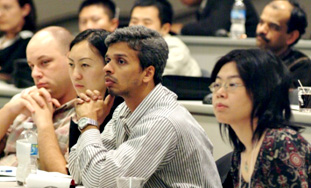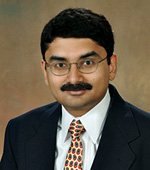Is it better for firms to underpromise and overdeliver? How can social media content and product search engine data be mined to give consumers a ranking system for choosing hotels? And for writers, musicians and other artists, is it a good idea to reveal a project’s details when attempting to obtain financial support on a crowd funding website such as kickstarter.com?

The UT Dallas Marketing Program hosts the FORMS conference as a more-approachable alternative to larger marketing science conferences.
Top marketing researchers are addressing these and other marketing issues this week at the Frank M. Bass UT Dallas Frontiers of Research in Marketing Science (FORMS) Conference at the Naveen Jindal School of Management.
The three-day conference, which runs through Saturday, Feb. 25, invites marketing professors from such universities as the Massachusetts Institute of Technology and the University of Pennsylvania’s Wharton School to present papers on such emerging trends as search engine key word pricing strategies, dynamic choice, retailing and collecting user-generated content for consumer rankings.

Dr. Ashutosh Prasad
The UT Dallas Marketing Program hosts the FORMS conference as a smaller alternative to the Marketing Science Conference hosted annually by the INFORMS Society for Marketing Science, said Associate Marketing Professor Dr. Ashutosh Prasad.
“The Marketing Science Conference hosts around 800-900 people, and many people had been going to smaller workshop-type conferences. We decided to try to host a conference that was similar, but distinguished in a few ways. It would cater to a smaller number, around 100 people, to allow for more face time, collaboration, idea-sharing and more time for the presenters to present,” Prasad said.
“Presenters talk for an hour, and then we have a discussant who takes 10 to 15 minutes to constructively critique the paper,” said Prasad. “The other important thing we wanted to do was help PhD students, and that was a focus of the conference right from the beginning. PhD students don’t have to pay a registration fee, and they get to meet leading marketing researchers from all around the world.”
“A group of consumers in China got together recently and went to a dealership and said they were all buying the same car and asked for a group deal. The Internet allows for that sort of coordination, which earlier was not possible.”
Dr. Ashutosh Prasad,
associate
marketing professor
The Internet has become a major force in the way companies market their products, and researchers are trying to understand how to harness its power to discover important marketing techniques, Prasad said. For example, crowd sourcing, crowd funding and mob buying have all changed the face of how marketing is evolving.
“A group of consumers in China got together recently and went to a dealership and said they were all buying the same car and asked for a group deal,” Prasad said. “The Internet allows for that sort of coordination, which earlier was not possible.”
Marketing researchers at the conference will also talk about the latest techniques and approaches to help drive marketing of the future.
“The audience might not actually need to learn these techniques unless they use it, but they need to know that such techniques are available or that there’s a person with expertise or a paper out there. It’s kind of like a web of knowledge, and if they need to draw on that information, it’s somewhere at the back of their mind,” Prasad said.